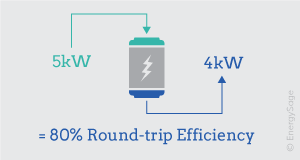Solar Energy Storage Batteries
Best batteries for solar power
In most cases, lithium ion batteries are the best option for a solar panel system, though other battery types can be more affordable.
Lead acid batteries
- Lead acid batteries are a tested technology that has been used in off-grid energy systems for decades.

Lithium ion batteries
Lithium ion battery advantages
There are many advantages to using a li-ion cell of battery. These li-ion battery advantages include:- High energy density: The high energy density is one of the chief advantages of lithium ion battery technology. With electronic equipment such as mobile phones needing to operate longer between charges while still consuming more power, there is always a need to batteries with a much higher energy density. In addition to this, there are many power applications from power tools to electric vehicles. The much higher power density offered by lithium ion batteries is a distinct advantage. Electric vehicles also need a battery technology that has a high energy density.
- Self-discharge: One issue with many rechargeable batteries is the self discharge rate. Lithium ion cells is that their rate of self-discharge is much lower than that of other rechargeable cells such as Ni-Cad and NiMH forms. It is typically around 5% in the first 4 hours after being charged but then falls to around 1 or 2% per month.
- Low maintenance: One major lithium ion battery advantage is that they do not require and maintenance to ensure their performance. Ni-Cad cells required a periodic discharge to ensure that they did not exhibit the memory effect. As this does not affect lithium ion cells, this process or other similar maintenance procedures are not required.
- No requirement for priming: Some rechargeable cells need to be primed when they receive their first charge. There is no requirement for this with lithium ion cells and batteries.
- Variety of types available: There are several types of lithium ion cell available. This advantage of lithium ion batteries can mean that the right technology can be used for the particular application needed. 犀利士 Some forms of lithium ion battery provide a high current density and are ideal for consumer mobile electronic equipment. Others are able to provide much higher current levels and are ideal for power tools and electric vehicles.
Salt Water / Acid Water Batteries
The saltwater battery is an ideal substitute for lead-acid batteries. The saltwater battery based on sodium-ion aqueous technology is a modular building block for clean energy storage systems. Saltwater technology is the safest and most environmentally-friendly way of storing electric power
How to compare your solar storage options
As you consider your solar-plus-storage options, you’ll come across a lot of complicated product specifications. The most important ones to use during your evaluation are the battery’s capacity & power ratings, depth of discharge (DoD), round-trip efficiency, warranty, and manufacturer.
Capacity & power
Capacity is the total amount of electricity that a solar battery can store, measured in kilowatt-hours (kWh). Most home solar batteries are designed to be “stackable,” which means that you can include multiple batteries with your solar-plus-storage system to get extra capacity. While capacity tells you how big your battery is, it doesn’t tell you how much electricity a battery can provide at a given moment. To get the full picture, you also need to consider the battery’s power rating. In the context of solar batteries, a power rating is the amount of electricity that a battery can deliver at one time. It is measured in kilowatts (kW). A battery with a high capacity and a low power rating would deliver a low amount of electricity (enough to run a few crucial appliances) for a long time. A battery with low capacity and a high power rating could run your entire home, but only for a few hours.
Depth of discharge (DoD)

Round-trip efficiency

Battery life & warranty
For most uses of home energy storage, your battery will “cycle” (charge and drain) daily. The battery’s ability to hold a charge will gradually decrease the more you use it. In this way, solar batteries are like the battery in your cell phone – you charge your phone each night to use it during the day, and as your phone gets older you’ll start to notice that the battery isn’t holding as much of a charge as it did when it was new.
Your solar battery will have a warranty that guarantees a certain number of cycles and/or years of useful life. Because battery performance naturally degrades over time, most manufacturers will also guarantee that the battery keeps a certain amount of its capacity over the course of the warranty. Therefore, the simple answer to the question “how long will my solar battery last?” is that it depends on the brand of battery you buy and and how much capacity it will lose over time.
For example, a battery might be warrantied for 5,000 cycles or 10 years at 70 percent of its original capacity. This means that at the end of the warranty, the battery will have lost no more than 30 percent of its original ability to store energy.
Manufacturer
Many different types of organizations are developing and manufacturing solar battery products, from automotive companies to tech startups. While a major automotive company entering the energy storage market likely has a longer history of product manufacturing, they may not offer the most revolutionary technology. By contrast, a tech startup might have a brand-new high-performing technology, but less of a track record to prove the battery’s long-term functionality.
Whether you choose a battery manufactured by a cutting-edge startup or a manufacturer with a long history depends on your priorities. Evaluating the warranties associated with each product can give you additional guidance as you make your decision.


Leave a Reply